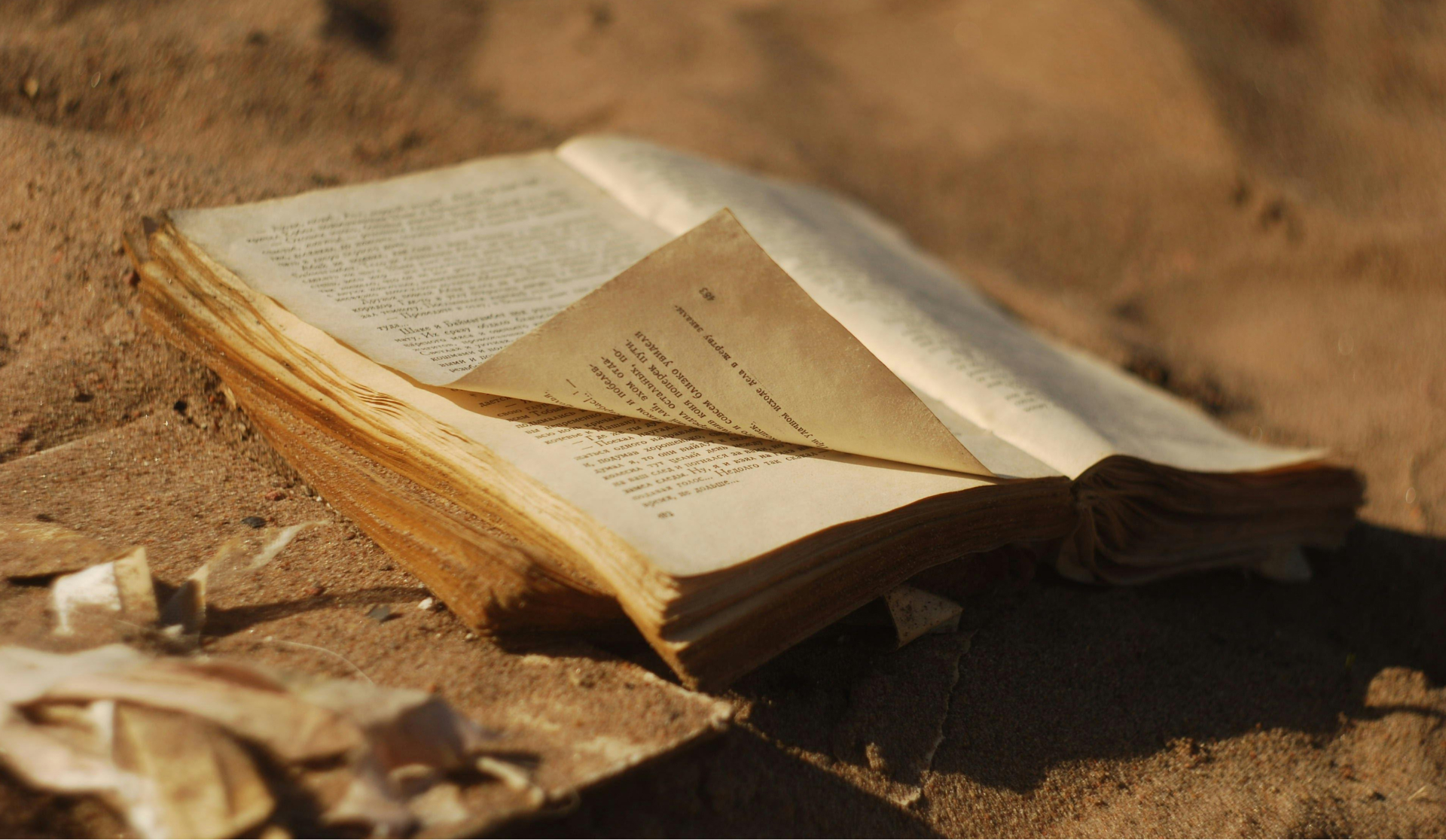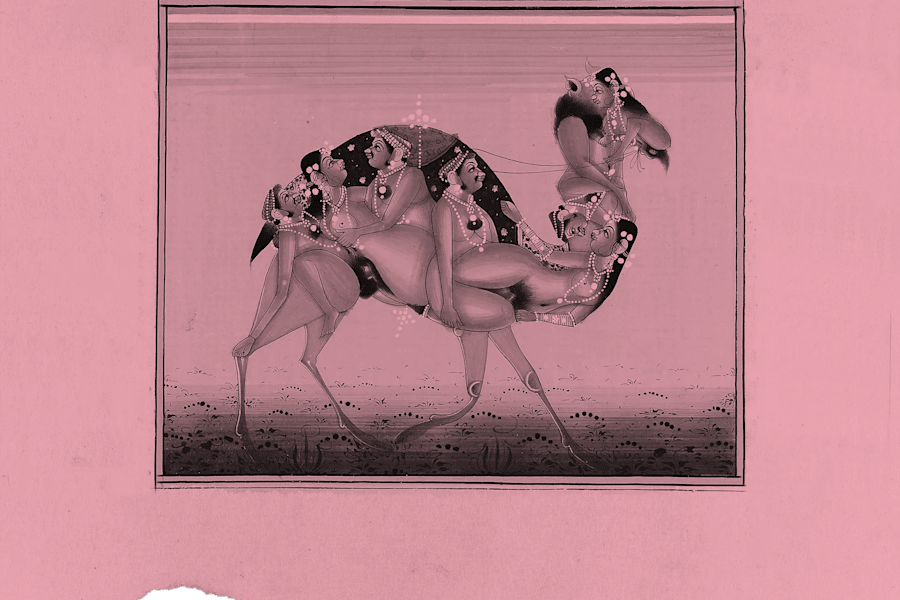Take off your jacket: The erotics of books

Past the talking stage is the reading stage. Ed Luker looks between the lines to find out what makes sharing words with new and old lovers so titillating.
During lockdown, reading the poet Lisa Robertson’s experimental novel The Baudelaire Fractal, I got lost in its erotics of surface. In a particularly striking part of the book, the narrator recalls the weight of a younger lover’s necklace as it drags across her bare flesh. “The work of desire is borderless,” she writes, as if it were hard to contain. Reading and writing give desire fixity—making it weighted, solid, like a gold pendant. If desire risks escaping us, then recollection gives it an anchor.
Reading can be important to the formation of a new relationship. The writer and founding editor of Parapraxis magazine, Hannah Zeavin, told me that when she met her poet partner, she admitted to disliking Emily Dickinson. He enrolled her in a one-to-one reeducation program: “He not-so jokingly sent me to Camp Dickinson, a reeducation camp where he was the only instructor and I the only student, and Emily our only subject. And so I fell in love with Dickinson as I fell in love with him.”
Similarly, the writer and novelist Lamorna Ash told me that reading a contemporary novel helped her traverse the erotic distance that kept her from her new lover: “This year I could not see the person I loved for many months. She'd told me she was midway through K Patrick’s unbelievably hot novel, Mrs S. I read it too, so I could feel close to her. I could imagine her being turned on by its horniest set pieces at the same time as they were turning me on; I could even remake us into versions of the lovers on the page. This was not the first time I have read a book for someone else, in order to cheat time and space. Sometimes this experience can be agonising; mostly it’s a gift.”
My own shelves contain books that belonged to lovers, each with its murky pool of reason and feeling about why it remains in my possession. One past lover has my copy of Vivian Gornick’s The Romance of American Communism. For a long time I wanted it back. Now, I’m glad it’s with her—even if I am also not. In his essay “Library Love,” the writer, filmmaker, and theorist Paul B. Preciado recounts how the books of his library are imbued with his past relationships. Some of these attached lovers are remembered with fondness, like Diedre, a “BDSM lover” from New York with whom Preciado read Hegel in German. He has held onto the Phenomenology of Spirit even though, “I will never be able to read it again.” The heavily annotated copy marks an unrecoverable intensity.
Some books contain the sting of bad relationships. Preciado writes with suspicion about the gift of a copy of Eden Eden Eden by the French author Pierre Guyotat from his former lover, Jean. In the aftermath of a complicated relationship, a witch instructed Preciado to keep the copy of Eden Eden Eden in the freezer. The reason for this quarantining? Preciado saw symmetries between the book’s contents and the behaviors of the former lover:
I wonder if the most violent and threatening parts of Eden Eden Eden, which Jean worshipped, were not already the passionate protocol shaping the form that Jean's obsession, his thirst for possession and his anger against me would take in the future.
Moving out of the apartment, leaving the frozen artefact behind, Preciado is unable to know whether the book ever thawed, is still frozen, or got thrown out. Perhaps control is relinquished so that Preciado can get more comfortable with doubt—or doubt is allowed to exist, then dim, such that the desire to control is undone. Preciado presents us with two alternatives for how books can be relics of our past relationships, each existing at different stages of resolution. With Diedre’s Hegel, the relationship is finished. The book is a memento to be kept clasped shut—but cherished. In the case of Jean’s Guyotat, the book must be kept out of sight, frozen in time if you like. The past is too much for the present to bear.
The novelist and poet Daisy Lafarge told me about a book she never got back: “At least once a month I think of my copy of The Practice of Everyday Life by Michel de Certeau. I bought it aged 19 from the Tate Modern bookshop. I read it passionately two years later, marking the margins with little love hearts and annotations. My boyfriend at the time ridiculed my girlish marginalia. A few years later, a different boyfriend followed suit, but still borrowed it for his PhD. When we broke up, I never got it back. Eight years later I wonder: where is that book now? Are the pencilled hearts intact or erased? It’s like I’m hoping for some magical reunion, to find it again by chance—I guess like any lost love.” Books and lovers both make impressions on us, they leave marks, they make us feel things, and they have entanglements with others.
Books are both sensual and mental objects. The writer August Lamm shared with me the place that two copies of the same book held in a brief romance: "I met a man at a café in Paris. We began seeing each other, sleeping together. He gave me an English copy of Orwell’s Down and Out in Paris in London, which he found too challenging as a non-native speaker. I read it quickly, filling it with underlines and annotations for him. When I finished, I bought him a French translation. We had sex. Afterward, in the dark, I asked if he could ever love me. He said no. I got dressed. ‘But you knew that,’ he said. I left both copies of the book on his desk: English and French, annotated and unopened."
Like jewelry or photographs, books are weighted relics that can make what’s gone real again. But unlike pendants or mere possessions, books are also portals, places of transfiguration, ways of thinking again, that can shift not just what something was—but also how we feel about it. The poet Rosie Stockton told me that there was a past lover with whom they developed a private language, via Tolstoy’s Anna Karenina: “I sent him that passage in Tolstoy's Anna Karenina where Levin and Kitty are at a party and enter into a sort of telepathic seance where they decode the meaning of strings of letters. When Levin wrote down ’w, y, t, m, i, c, n, b, d, t, m, n, o, t?,’ Kitty (being in love) decoded it: ‘When you told me it could never be, did that mean never, or then?’” Rosie and their lover started doing the same: “understanding each other's incomprehensibly complex strings of letters, our private language. Having historically identified with the tortured Anna, when we broke up I chose Levin's path instead, and sublimated my broken heart by… gardening."
Books can help us handle doubt and loss. As social objects they create ambivalence around possession and ownership, creating a form that we can learn how to become comfortable with. In how far you’ve come you might see how much you managed to let something go. Close the cover, if you want. Open the next.


